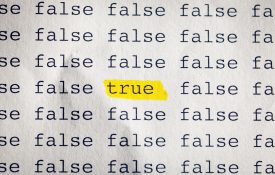-
How Do We Make Moral Judgments? – Insights From Psychological Science
New research published in Psychological Science, a journal of the Association for Psychological Science, provides intriguing insights into some of the factors that influence how we make moral judgments. Reappraising Our Emotions Allows Cooler Heads to Prevail We might like to think that our judgments are always well thought-out, but research suggests that our moral judgments are often based on intuition. Our emotions seem to drive our intuitions, giving us the gut feeling that something is ‘right’ or ‘wrong.’ In some cases, however, we seem to be able to override these initial reactions.
-

Misinformation: Psychological Science Shows Why It Sticks and How to Fix It
Childhood vaccines do not cause autism. Global warming is confirmed by science. And yet, many people believe claims to the contrary. Why does misinformation stick?
-
Misinformation and Its Correction: Continued Influence and Successful Debiasing
Read the Full Text (PDF, HTML) Evidence shows that vaccines do not cause autism, that global warming is actually occurring, and that President Obama was indeed born in the United States. Why then do people still -- often passionately -- believe the opposite to be true? In this report, Lewandowsky (University of Western Australia) and colleagues review recent psychological science detailing common sources of misinformation, processes for evaluating the validity of new information, and strategies for combating the effects of misinformation. Cognitively, it is much easier for people to accept a given piece of information than to evaluate its truthfulness.
-

Prejudice Can Cause Depression at the Societal, Interpersonal, and Intrapersonal Levels
Although depression and prejudice traditionally fall into different areas of study and treatment, a new article suggests that many cases of depression may be caused by prejudice from the self or from another person.
-
Secondary Analyses and Archiving of Social and Behavioral Datasets in Aging
The National Institute on Aging (NIA) recently issued two R03 grant announcements. R03 grants support small research projects that can be carried out in a short period of time with limited resources. The announcements are soliciting applications for (1) secondary analysis of data on aging in the areas of psychology, behavioral genetics, economics, demography, or (2) archiving and dissemination of data sets. These two announcements have two separate funds of $1,000,000 each as well as separate reviews and due dates. R03 RFA AG13-004 Secondary Analyses and Archiving of Social and Behavioral Datasets in Aging (R03): Researchers can request up to $50K in direct cost per year for only one year.
-
Improving Memory for Specific Events Can Alleviate Symptoms of Depression
Hear the word "party" and memories of your 8th birthday sleepover or the big bash you attended last New Year’s may come rushing to mind. But it’s exactly these kinds of memories, embedded in a specific place and time, that people with depression have difficulty recalling. Research has shown that people who suffer from, or are at risk of, depression have difficulty tapping into specific memories from their own past, an impairment that affects their ability to solve problems and leads them to focus on feelings of distress.

